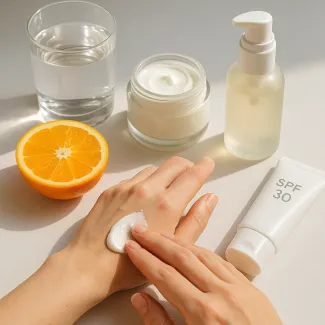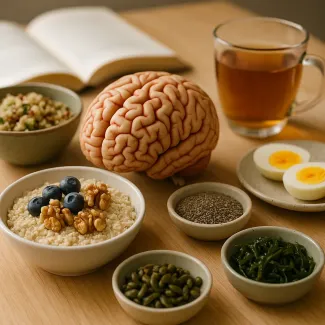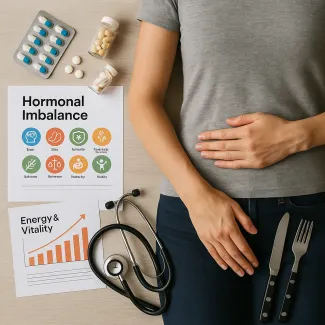
Reclaim your vitality: daily wellness rituals for thriving in your 30s
How mindful routines and smart habits can enhance physical, mental, and hormonal well-being after 30
Entering your 30s is more than a numerical shift—it’s a turning point where the body and mind start to react differently to stress, food, sleep, and movement. What once worked in your 20s may now feel unsustainable or even counterproductive. As life accelerates with career, family, and responsibilities, maintaining balance and vitality becomes a conscious effort, not an accidental outcome. This article offers a deep dive into practical and highly effective wellness strategies to support better health, energy, and resilience throughout your 30s and beyond.
From adjusting your circadian rhythm and boosting hormonal harmony to improving gut integrity and skin glow, we’ll explore routines that match your evolving biology. By learning to read your body’s new signals and respond with care—not pressure—you can create lasting physical and emotional well-being that carries through every phase of adulthood.
The changing body after 30: understanding the new baseline
As the body matures, metabolic flexibility begins to decline. Muscle regeneration slows, sleep quality may dip, and the body becomes more sensitive to stress and inflammation. Women often begin to experience pre-hormonal shifts, while men may notice drops in energy or libido. Even subtle changes like skin dullness, slower digestion, or increased anxiety may signal the need for new habits.
This decade is a biological checkpoint where small, consistent adjustments bring far greater returns than intense short-term fixes. Instead of reacting to burnout or symptoms, now is the time to build core daily routines that preserve hormonal balance, support digestion, improve sleep, and fuel brain clarity.
Morning practices that set the tone for sustained wellness
Your first 60 minutes after waking carry more biological weight than most realize. They determine your cortisol balance, affect your glucose stability, and lay the mental groundwork for the day.
Expose your eyes to natural light as early as possible. This regulates circadian rhythm, reinforces serotonin production, and signals your body that it's time to be alert. Combine this with 5–10 minutes of gentle stretching or mobility movement to signal your fascia and lymphatic systems that you are ready to begin the day with circulation and oxygenation.
Hydration is non-negotiable. After a night of water loss through breath and sweat, your cells need replenishment. Begin with 500 ml (2 cups) of filtered water, optionally with electrolytes or lemon, to stimulate digestion, hydrate cells, and prepare the metabolism.
A nourishing breakfast rich in fiber, protein, and healthy fats helps stabilize glucose response and avoids the spike–crash cycle. Focus on ingredients like chia seeds, eggs, avocado, berries, or oats—and avoid excess caffeine on an empty stomach, which can trigger adrenal stress and hormonal imbalance.
Rebalancing hormones naturally through nutrition and movement
In your 30s, hormones don’t just control reproduction—they regulate energy, metabolism, weight stability, mood, sleep, and immunity. One of the most strategic lifestyle shifts is supporting hormonal health through food and movement.
For women, supporting progesterone and estrogen balance means avoiding inflammatory foods and increasing intake of B vitamins, magnesium, omega‑3s, and liver-supportive nutrients. For men, optimizing testosterone and dopamine function is often tied to zinc, healthy fats, strength training, and sleep quality.
Prioritize whole, unprocessed foods. Add cruciferous vegetables like broccoli, kale, and cauliflower to aid estrogen detox. Include healthy fats such as olive oil, fatty fish, flaxseeds, and walnuts to promote stable energy and hormone transport.
Resistance training at least 2–3 times per week is proven to stimulate hormonal balance, bone density, and increase insulin sensitivity. Pair this with moderate-intensity movement like brisk walking, hiking, or swimming for cardiovascular support.
Managing stress before it manages you
In your 30s, stress no longer bounces off the body as easily. Cortisol surges can linger longer, and chronic activation of the sympathetic nervous system leads to fatigue, brain fog, or skin flare-ups. That’s why stress management is no longer optional—it’s central to overall well-being.
Simple daily tools like diaphragmatic breathing, short nature walks, digital detox windows, or 5-minute meditations can dramatically shift your nervous system from fight-or-flight into rest and recovery.
Adaptogenic herbs such as ashwagandha, rhodiola, and holy basil can support your stress response and help the hypothalamic-pituitary-adrenal (HPA) axis adapt more effectively. Combine these with consistent sleep routines and mindful eating habits, and the body gradually recalibrates its internal environment.
Gut health as the foundation of vitality
After 30, digestive changes can begin to emerge—slower motility, less stomach acid, food sensitivities, or bloating that didn’t exist before. The gut becomes central to how you feel mentally and physically.
Focus on fermented foods, such as sauerkraut, kefir, yogurt, or kimchi, which replenish beneficial bacteria. Prebiotic fibers—found in onions, garlic, leeks, artichokes, and asparagus—feed these microbes and support microbiome diversity.
Eliminate ultra-processed foods, excessive sugar, and alcohol that disrupt gut lining integrity and create systemic inflammation. If needed, include digestive enzymes, L-glutamine, and collagen to support the repair of the gut wall and improve nutrient absorption.
A healthy gut also plays a role in hormonal detoxification, neurotransmitter production (especially serotonin), and immune regulation. It truly is the command center for total well-being.
Glowing from within: skin as a reflection of internal health
The skin becomes less forgiving in your 30s. What was once a post-party blemish may now become persistent dullness, uneven tone, or dryness. This is not just cosmetic—it’s information.
Focus on internal skin nutrition: prioritize vitamin C, E, A, zinc, selenium, and collagen-rich foods. Hydration remains vital—aim for 2.5–3 liters per day, and pair water with electrolytes to ensure it reaches your cells.
Limit overexposure to sun and synthetic skincare. Instead, favor gentle acids, botanical oils, and non-toxic moisturizers that preserve the skin barrier. Don’t skip sleep—it’s when the skin repairs collagen and regulates hydration.
Sleep quality over quantity: resetting the circadian code
Sleep in your 30s is more vulnerable to disruption due to stress, screen time, parenting, or hormones. Rather than aiming just for 8 hours, aim for deep, restorative sleep that activates repair processes.
Set a consistent wind-down routine: dim lights, reduce blue light, and avoid food or caffeine 2–3 hours before bed. Use magnesium, glycine, or herbal teas (like passionflower or chamomile) to support GABA activity and nervous system calm.
Try to go to bed and wake up at consistent times—even on weekends. Consistency anchors your circadian rhythm, which influences everything from immune function to skin regeneration and mood stability.
Mental clarity and focus: protecting brain health
Cognitive performance begins to subtly shift in your 30s. Many experience slower recall, multitasking fatigue, or reduced motivation. But these are not irreversible signs of aging—they’re signals for recalibration.
Boost brain function with foods high in choline (eggs, liver), omega‑3 fatty acids (salmon, sardines), polyphenols (blueberries, green tea), and flavonoids (dark chocolate, citrus). Avoid sugar crashes and erratic caffeine spikes, which deplete neurotransmitter reserves.
Daily movement, even a 20-minute walk, can increase BDNF (brain-derived neurotrophic factor), a compound that supports memory and learning. Try periodic digital breaks and focus-enhancing techniques like Pomodoro intervals or ambient music for productivity.
Energy slumps: restoring your natural rhythm without stimulants
Many in their 30s rely on caffeine to overcome afternoon crashes or morning brain fog. While caffeine can be helpful, it often masks underlying blood sugar instability, poor sleep, or adrenal fatigue.
Instead, use food and rhythm to stabilize your energy. Eat balanced meals every 4–5 hours with slow carbs, clean proteins, and good fats. Incorporate movement after meals to improve glucose metabolism and prevent the post-lunch slump.
Consider short midday resets, like 10 minutes of sunshine, walking, or breathwork, rather than sugar or coffee. You’ll build sustainable, smooth energy that flows with your biological rhythm, not against it.
Immune support as daily maintenance, not seasonal urgency
Your immune system in your 30s can still be resilient—but chronic stress, nutrient depletion, poor gut health, and lack of sleep can reduce its responsiveness. Rather than waiting for illness, integrate immune support as part of your wellness baseline.
Prioritize vitamin D, zinc, selenium, vitamin C, and probiotic diversity. Moderate exercise, sunshine, and sleep create a robust immunological foundation.
Avoid antibiotics unless absolutely necessary and support natural microbial diversity with a plant-rich diet. Immune strength is not just about fighting illness—it’s the shield for energy, cognition, and recovery.
Emotional balance: cultivating resilience with mindful living
Mental well-being is central to long-term health. Your 30s often bring major identity shifts, financial stressors, and relationship changes—all of which demand emotional capacity.
Support your emotional system by building rituals of reflection, such as journaling, talking therapy, group connection, or creative expression. Rewire inner self-talk by recognizing when your nervous system is in “protect” mode and learning to respond with nurture rather than pressure.
Laughter, play, and spaciousness are not luxuries—they’re neurochemical tools for emotional resilience. Even five minutes a day of joyful interruption changes the chemistry of stress and reinforces your sense of self.
Redefining self-care for modern adulthood
Forget bubble baths as your only definition of self-care. In your 30s, it means saying no to overextension, choosing quality over hustle, and recognizing the body’s whispers before they become screams.
Build in recovery time—whether that’s movement, silence, hydration, play, or human connection. Recognize burnout triggers early, and design your week with buffer zones, not just tasks and outputs.
True self-care is proactive and biological. It’s the internal habit of protecting energy, nourishing systems, and honoring your own biology in an overstimulated world.
Creating your personal wellness blueprint
Your 30s are a decade of transformation, integration, and recalibration. Use this phase to identify what your body truly needs—not what worked in your 20s or what society expects.
Track your own rhythms: when you sleep best, how your digestion responds, what calms your stress. Then design a blueprint of rituals, food, movement, rest, and joy that supports your unique health expression.
By creating consistency with adaptability, your wellness becomes sustainable. You’re no longer chasing balance—you’re living in it.





